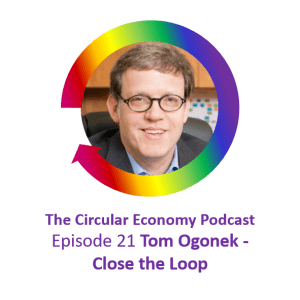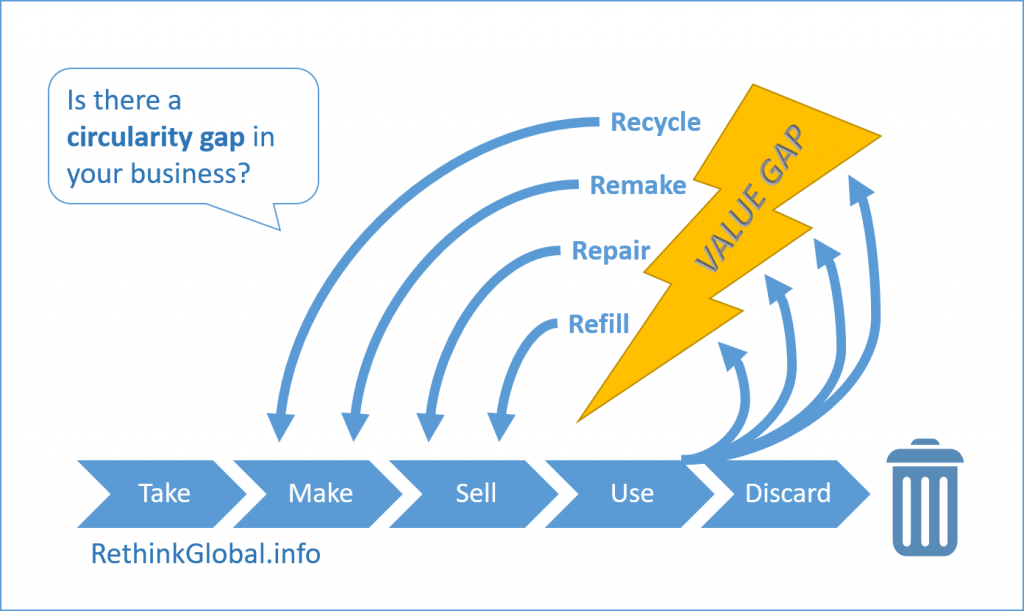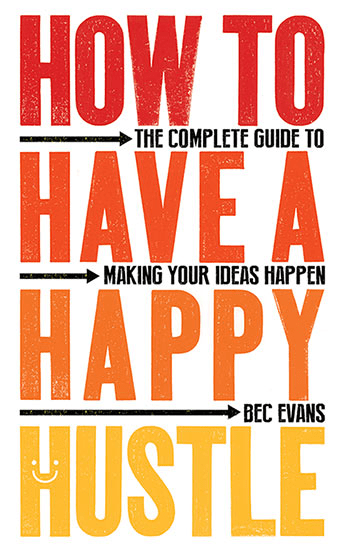Close the Loop | Linear risk & circularity gaps | Circularity for human development | Happy Hustle giveaway | Hot Air
If you can't do great things, do small things in a great way - Napoleon Hill
We help entrepreneurs, companies and business leaders discover and use the circular economy – to build profitable, resilient, sustainable and successful businesses. We believe in a circular economy that is fair, transparent and inclusive, to create a better world for everyone.
Welcome to the latest fortnightly round-up of what we’ve shared, and what’s inspired us. In this issue:
- Episode 21 of the Circular Economy podcast, with Tom Ogonek of Close the Loop
- Latest Linear Risks blog: Who is exploiting the circularity gap in your business?
- Free download: Making the Circular Economy Work for Human Development
- Last chance to win How to Have a Happy Hustle
- What we’ve been reading
- Thank you letters
- Optimism and Outrage – our latest!
Did you receive this email from someone else? You need your own! Stay in touch for free circular economy insights and updates, direct to your Inbox.
Don’t want to hear from us any more? Just unsubscribe!
Circular Economy Podcast #21
In this episode, we chat with Tom Ogonek, Co-CEO of Close the Loop Inc. Tom joined Close the Loop in 2011 and oversees all aspects of global operations, building on a background in chemistry and manufacturing, and using his environmental industry perspective plus over 20 years of valuable operations experience to drive the business forward.
Close the Loop make it easy to take back, recover, and reuse your high value products – so they don’t end up in rivers, landfills – or on someone else’s assembly line.
Close the Loop operates circular economy services in Australia, the US and Europe, helping keep the value in the system, instead of leaving it on the table for someone else.
Episode show notes and audioplayer here
Find the podcast series on iTunes, Google Podcasts, PlayerFM, Spotify, TuneIn, or search for “circular economy” in your favourite podcast app.
PS We’d love it if you could post a review, and help other people find us!
Who is exploiting the circularity gap in your business?
The second blog in our Linear Risks series asks whether there is a gap at the end of your value chain, leaving room for competitors to profit from your products, materials and reputation. We explain how circular approaches can close this gap and help you capture that value.
You can read the first linear risks blog here, and listen to our Linear Economy and Risks podcast episode.
For more on the system-level implications of the linear economy, read the latest Circularity Gap Report from Circle Economy and others (published Jan 2020). The first report, in 2018, analysed global resource stocks and flows, to announce that ‘Our world economy is only 9.1 per cent circular, leaving a massive ‘Circularity Gap’. Now, we are wasting more and recycling less, meaning our world economy is only 8.6 per cent circular.
Making the Circular Economy Work for Human Development
Free download before 7 March 2020
Peter’s last blog, Inclusive Capitalism – the basis of a just and fair circular economy?, noted that in the last 25 years, there has been an increasing awareness amongst businesses that all key stakeholders need to be considered in directors’ decision-making. This more inclusive capitalism includes a focus on people and planet as well as profit. Peter has co-written an article with Patrick Schröder of Chatham House and Alexandre Lemille of Anthesis: ‘Making the Circular Economy Work for Human Development‘. The paper, published in Resources, Conservation & Recycling in Science Direct, ‘attempts to develop a framework that combines the circular economy and the human development approach. The aim is twofold: On the one hand, it aims to address the missing social dimensions of the circular economy agenda. On the other hand, it aims to include considerations of environmental sustainability in the human development approach.’
You can access the article for free BEFORE MARCH 7th 2020 here. No sign up, registration or fees are required.
How to Have a Happy Hustle – book giveaway!
In Episode 20 of the podcast, I used some of Bec Evans’ suggestions from her brilliant book, “How to Have a Happy Hustle: the complete guide to making your ideas happen”. Bec wrote the book for those looking to get fulfilment by doing something new, especially a startup or side project, and it’s got lots of practical tips and strategies to help you uncover problems that are ripe for circular economy solutions.
Bec has kindly offered a copy to give away… thanks Bec! So here’s how to win… Leave a review on iTunes or your favourite podcast app, take a screenshot and email it to: hello@rethinkglobal.info by the closing date of 28 February 2020. We’ll select one of the entries at random and the winner will receive “How to Have a Happy Hustle: the complete guide to making your ideas happen” as an e-book.
What we’ve been reading
Catherine enjoyed reading Mike Berners-Lee‘s latest book – There is no Planet B: a handbook for the make or break years
The book blurb says: ‘Feeding the world, climate change, biodiversity, antibiotics, plastics – the list of concerns seems endless. But what is most pressing, what are the knock-on effects of our actions, and what should we do first? Do we all need to become vegetarian? How can we fly in a low-carbon world? Should we frack? How can we take control of technology? Does it all come down to population? And, given the global nature of the challenges we now face, what on Earth can any of us do?
Fortunately, Mike Berners-Lee has crunched the numbers and plotted a course of action that is practical and even enjoyable. There is No Planet B maps it out in an accessible and entertaining way, filled with astonishing facts and analysis. For the first time you’ll find big-picture perspective on the environmental and economic challenges of the day laid out in one place, and traced through to the underlying roots – questions of how we live and think.
This book will shock you, surprise you – and then make you laugh. And you’ll find practical and even inspiring ideas for what you can actually do to help humanity thrive on this – our only – planet.’
You can see Mike’s talk at the RSA here, and here’s a review of the book on GoodReads.
The circular economy tends to focus on resource scarcity and price volatility, meaning we may lose sight of issues relating to land, water and energy. This article from the UK-based Sustainable Food Trust looks at the hidden water footprint of imported fruit and vegetables, and the implications for communities in the growing regions.
Thank you letters
To Alex Magnin of Sustainability Illustrated for his latest animation – an excellent short video intro to the circular economy that you can share with your teams, to get everyone thinking about “when everything is healthy food for something else.”
Optimism and outrage
Inspired by the ‘Outrage and Optimism podcast‘ by Christiana Figueres (Executive Secretary of the UNFCCC 2010-2016), Tom Rivett-Carnac (ex UNFCCC and CDP) and their team at Global Optimism, we’re highlighting things we’re feeling optimistic about…and outraged by…
To inject a dose of optimism, you might like EDIE’s Seven Top Tips for Kick Starting your Organisation’s Net Zero Transition
In Insights #13, we got a bit over-excited about some of the PR from Davos, noting that Microsoft has committed to actively remove carbon from the atmosphere — going “carbon negative” by 2030. We highlighted Microsoft’s bolder pledge, by 2050, to “remove from the environment all the carbon the company has emitted either directly or by electrical consumption since it was founded in 1975.”
But now, we’re outraged. Last week, I spotted this article by Indi Samarajiva on Medium: “Microsoft’s Carbon Plan Is Hot Air” explaining that ‘Microsoft is going carbon negative by 2030, but they’re still using their technology to extract more carbon. This like a tobacco executive that quits smoking. Good for you, but your product is still killing people.’
And we’re outraged that this report from JP Morgan was leaked, not published…
JP Morgan, ‘the world’s largest financier of fossil fuels; has warned clients that the ‘climate crisis threatens the survival of humanity and that the planet is on an unsustainable trajectory’. Its report was obtained by Rupert Read, an Extinction Rebellion spokesperson and philosophy academic at the University of East Anglia, and was covered in the Guardian: JP Morgan economists warn climate crisis is threat to human race. The report on the ‘economic risks of human-caused global heating said climate policy had to change or else the world faced irreversible consequences.’ And yet JP Morgan continues to invest in fossil fuels….
Hope you have a good week… Catherine Weetman & Peter Desmond
Did you receive this email from someone else? You need your own! Stay in touch for free circular economy insights and updates, direct to your Inbox.
Please feel free to forward the newsletter to any of your friends or colleagues who are interested in all things circular! Don’t want to hear from us? Just unsubscribe!


